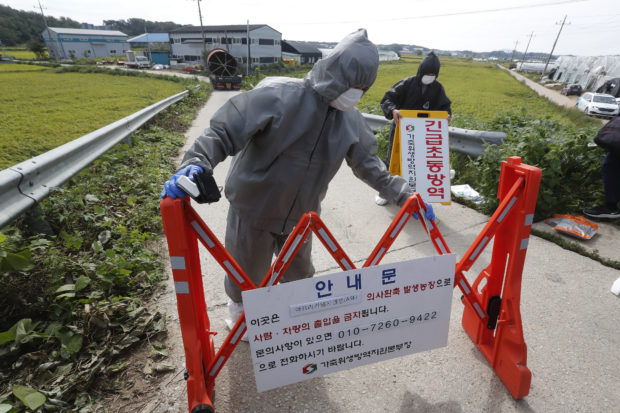South Korea confirms 2nd case of African swine fever
SEOUL, South Korea – South Korea on Wednesday confirmed a second case of African swine fever near its border with North Korea, raising concerns that the outbreak could spread and wreak havoc on the country’s massive pig herds.

Quarantine officials wearing protective gears place barricades as a precaution against African swine fever at a pig farm in Paju, South Korea, Tuesday, Sept. 17, 2019. South Korea is culling thousands of pigs after confirming African swine fever at a farm near its border with North Korea, which had an outbreak in May. The notice reads: “Under quarantine.” (AP Photo/Ahn Young-joon)
Officials were planning to cull some 5,000 pigs raised at a farm in the town of Yeoncheon after the highly contagious disease was confirmed in tests of a dead pig, a South Korean agriculture ministry official said.
Officials culled nearly 4,000 pigs and stepped up quarantine efforts Tuesday after confirming the country’s first case of the disease at the nearby city of Paju.
African swine fever has decimated pig herds in China and other Asian countries before reaching the Koreas. It is harmless to people but for pigs is highly contagious and fatal. There is no known cure.
“We will obviously cull the 4,700 pigs raised at the Yeoncheon farm and could cull more pigs at farms in neighboring areas if needed,” said the ministry official, who didn’t want to be named, citing office rules.
The ministry said officials also strengthened efforts to disinfect farms and vehicles and restrict movement of farmers, animals and visitors to contain the disease.
Article continues after this advertisementThere are about 6,300 farms in South Korea that raise more than 11 million pigs.
Article continues after this advertisementThe outbreak in South Korea comes after months of heightened monitoring efforts at border area farms after the disease spread to North Korea in May.
North Korea in recent months has virtually scrapped all diplomatic activity and cooperation with South Korea amid a standstill in nuclear negotiations with the United States, and has ignored repeated South Korean calls for joint efforts to stem the spread of the disease.
South Korean investigators are tracing the source of the outbreak, and officials say it isn’t immediately clear if the disease would have crossed from the North.
Seoul’s Unification Ministry, which deals with inter-Korean affairs, said Wednesday that it notified the North of the outbreak in South Korea through a liaison office at a North Korean border town.
South Korea in past months had placed hundreds of fences and traps around border area farms to prevent pigs from being infected by wild boars that roam in and out of North Korea. While government officials said it would be difficult for the animals to cross over barbed wire fences in the mine-scattered border zone, they could possibly swim across rivers.
South Korea’s environment ministry said it plans to dispatch personnel to strengthen monitoring on movement of wild boars in border areas and install more traps and nets. The ministry said it asked local officials not to shoot the animals because gunshot sounds could cause them to scurry and cover more ground. /gsg